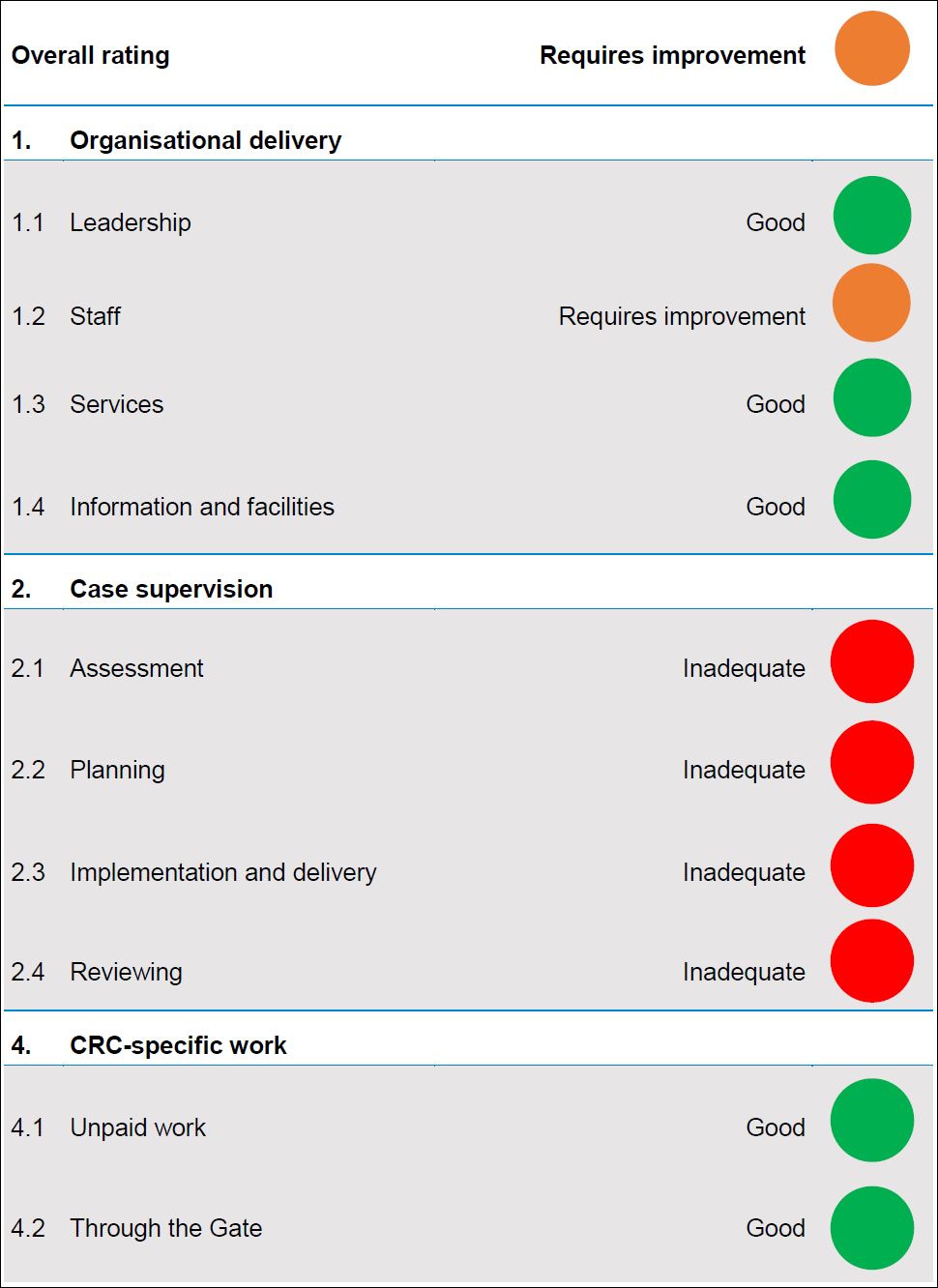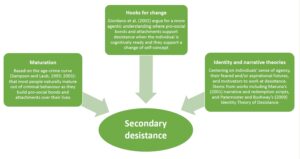Worrying trend of inadequate case supervision
For the third time in a week, the probation inspectorate has rated all four components of a CRC’s case supervision – assessment, planning, implementation & delivery & review – inadequate. Today’s report focuses on the West Yorkshire CRC.
HM Inspectorate of Probation conducted its annual inspection of West Yorkshire Community Company (CRC) in autumn. Inspectors were concerned to find the organisation – which supervises low and medium-risk offenders – had cut the number of probation officers since their last visit.
Chief Inspector of Probation Justin Russell said:
“When we inspected West Yorkshire CRC in 2018 we found challenging staffing levels and many staff told us they were overwhelmed. This affected the CRC’s ability to supervise individuals effectively.
Since then, the CRC has restructured and reduced the number of qualified probation officers. This has resulted in staff at a lower grade taking on larger workloads – even though some of them lack the necessary skills and experience to undertake complex work.”
Inspectors have given West Yorkshire CRC an overall rating of ‘Requires improvement’ – retaining the same grade that they received in 2018.
Inspectors noted that senior leaders had put an improvement plan in place since the last inspection, but this had not resulted in better quality supervision.
Mr Russell said:
“During this inspection we analysed a sample of cases to find out how staff assess, plan, deliver and review activity with individuals on probation. We found the management of risk of harm was consistently poor.
A large proportion of cases involve domestic abuse and safeguarding issues. Major improvements are needed to ensure staff use all the available information to assess risk factors. They should also work with other agencies, such as the police and children’s services, to manage potential risks of harm.
As a result, we have rated all four aspects ‘Inadequate’ – our lowest possible grade.”
The Inspectorate concluded that senior leaders are doing their best to improve the quality of work but their efforts are undermined by resourcing constraints.
Inspectors did note West Yorkshire CRC has some strengths.
The CRC helps individuals to access a comprehensive range of services to help them move away from further offending. Individuals can receive support through a mentor or with issues such as substance misuse and mental health, for example. Specialist services are also available for women and people of South Asian heritage.
Inspectors also noted effective Through the Gate services, which support people as they leave prison and resettle in the community. Additional funding from central government has helped to pay for more staff and has resulted in better coordination between agencies. The Inspectorate rated this area of work as ‘Good’.
Key findings
Inspectors organised their key findings under three main headings: organisational delivery; case supervision and unpaid work & through-the-gate.
Organisational delivery
Leadership is rated as ‘Good’. Senior leaders in the CRC have had to face some difficult challenges in the last year, responding to a major organisational restructure of CRC services by Interserve Justice that resulted from reductions in the funding available under the contract with the Ministry of Justice. They have attempted to mitigate the impact of these changes where possible, and have been open and responsive to the concerns of staff, the service user council, partners and suppliers – although reduced resources have clearly had an impact on the quality of the case supervision we inspected.
Where new resources have been made available – for example, for enhanced Through the Gate services – they implemented the changes effectively, and the quality was good. They have also been successful in obtaining funds from the Ministry of Justice to improve liaison with sentencers, using a dedicated team of staff operating in magistrates’ courts in Leeds and Bradford. Despite the domain two scores for case supervision being rated as ‘Inadequate’, we have rated leadership as ‘Good’, as senior leaders have continued to focus on trying to improve the quality of work in the face of considerable challenges. However, without additional trained probation officers, this focus has not had the desired impact on the quality of case management.
Key strengths of the organisation are as follows:
- A strong, cohesive management group trying to drive forward improvement and has a good understanding of the quality of delivery.
- Staff speak positively about their managers and receive regular supervision.
- The CRC has a wealth of data available, including an innovative reoffending data tool, for identifying service users’ needs and priorities for commissioning services.
- The CRC has comprehensive quality management systems in place.
The main areas for improvement are as follows:
- The workloads of responsible officers are excessive, middle managers are stretched and unqualified probation services officers require more development than middle managers are able to give.
- As the Enablers of Change assessment and planning information technology system has not been implemented, the CRC needs to find an alternative way of ensuring that individuals are fully involved in developing their sentence plans, with clear links between these plans and plans to manage risk of harm to others.
- New group rehabilitation activity requirements are not yet being used sufficiently.
- Responsible officers’ engagement with other organisations involved in managing risk of harm to others needs strengthening.
Case supervision
Inspectors were extremely critical about the core probation task of supervising offenders.
Key strengths of case supervision are as follows:
- Responsible officers engage well with individuals throughout the course of their supervision, enforcing orders and licences appropriately, and ensuring that the sentence of the court is delivered.
- Staff are good at identifying individuals’ strengths and factors that will help them stay away from offending, in line with the CRC’s operating model.
- In a reasonable majority of cases, responsible officers correctly identify the factors that are linked to individuals’ offending and desistance, when completing layer 3 Offender Assessment System (OASys) assessments.
Areas of case supervision requiring improvement are as follows:
- In too many cases, assessments of the risk of harm that individuals pose to others are insufficient because responsible officers fail to take account of information available on file or from other agencies that can identify risk factors.
- Engagement plans are often written before OASys assessments are completed, and therefore fail to take sufficient account of offending factors and priorities for managing risk of harm to others.
- Too few assessments and plans contain analyses of an individual’s diversity and personal circumstances. If addressed this would enable services to be provided in ways that would improve compliance and engagement.
- Planning to manage risk of harm to others is frequently insufficient because assessments often fail to identify victims and potential victims. Contingency planning is weak and not specific to the risks in each case.
- In the majority of cases, although a good menu of services is potentially available, too few services are actually delivered to address offending and desistance or to manage the risk of harm to others.
- In too many cases, there is insufficient coordination with other agencies to manage risk of harm to others.
Unpaid work and through-the-gate
Key strengths of unpaid work are:
- Placement coordinators and work-party supervisors are skilled, and are respected and seen as fair by those under their supervision. They are good at engaging individuals and modelling appropriate behaviour.
- A strong health and safety culture is modelled by all staff.
- There is appropriate provision for female offenders, both on group and individual placements.
Areas for improvement in unpaid work are:
- There are insufficient opportunities for individuals on group placements to learn skills or gain accreditation of learning that will help them to obtain future employment.
- Individuals and staff express frustration at the difficulties in contacting responsible officers based in the professional service centre in Liverpool who oversee those on single requirement orders. This makes it difficult for them to liaise about attendance, provide evidence of acceptable absences,or discuss the possibility of undertaking education or training activity while on unpaid work.
Key strengths of Through the Gate are:
- Resettlement planning is detailed, with appropriate referrals made to a range of interventions and activities to support individuals’ transition back into the community.
- There is effective join-up of Through the Gate activity and resettlement services in the community, supported by the use of nDelius to record activity, and the high-intensity treatment team, which provides services for the most complex individuals in prison and on release.
- Comprehensive mentoring services are provided for individuals on release by the Together Women Project, P3 and the Prison Advice and Care Trust (PACT).
The areas for improvement in Through the Gate work was:
- In a small minority of cases, resettlement planning takes insufficient account of factors related to the risk of harm to others.
- The details of appointments made for individuals following release are not always specified in their records, which makes it difficult for staff in resettlement teams to prioritise tasks.
- Too many individuals are released without a clear indication of where they will spend their first night in the community.
Conclusion
The Probation Inspectorate works on a four-band rating system: excellent, good, requires improvement and poor. It is very disappointing to see that the performance of West Yorks CRC has not improved at all over the last year, scoring exactly the same number of points more in my unofficial probation league table and retaining its “requires improvement” rating.









